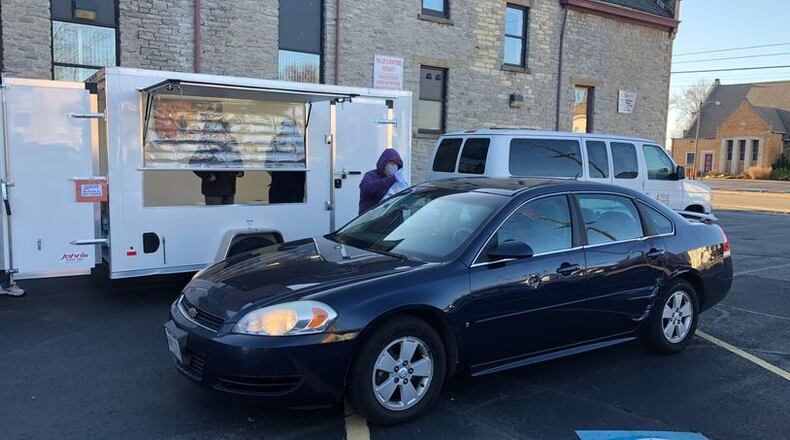“It’s a vicious cycle,” he said. “It’s an never-ending situation.”
Even though SHALOM doesn’t start its nine-week housing season until Jan. 5, Fugate said the all-volunteer agency has already received numerous requests for assistance.
“The homeless hasn’t dwindled even with the efforts of the city,” Fugate said. “There are constantly new homeless.”
SHALOM, operating without federal financial assistance, was founded in 2002 by Roy and Pat Ickes .
Of the 91 SHALOM served earlier this year, Fugate said there were 41 females and one child. When asked why the number of females becoming homeless is rising, Fugate was lost for the answer.
“Good question,” he said. “I’m sure some of it has to do with housing, but it has to be more than that.”
When parents and their children become homeless, SHALOM tries to find other places for them to stay. If that isn’t an option. SHALOM takes in the children and typically the family stays in the same room when possible, he said.
SHALOM clients sleep on mats and the men and women are in separate rooms. Those needing assistance are picked up every day at 5 p.m. at the SHALOM office, then driven to the host church. Volunteers feed the homeless dinner and breakfast and chaperone throughout the night, Fugate said.
Daily intakes are performed from 4-5 p.m. of the hosting season. New guests must arrive at 4 p.m. on their initial day of stay, according to Fugate.
Eight churches are hosting the nine-week schedule with Stratford Heights hosting consecutive weeks. Tytus Avenue Church of God is allowing churches that want to host use their facilities.
Fugate called the partnership with Tytus Avenue Church of God “a real blessing” because it allows churches that don’t have the required space an opportunity to host for a week.
SHALOM is still seeking area churches to host or partner with a hosting church, he said. The agency would like churches from surrounding communities get involved in the program. He said many of those SHALOM serves cone from the Oxford community, but churches there are located too far away to host.
Addressing homelessness in Butler County has been a heavily debated topic for years.
Last month, Butler County commissioners announced plans to hire a coordinator to keep a “laser focus” on the problems facing the homeless.
The commissioners convened a second Housing Insecurity and Advocacy Summit with fellow elected officials from other jurisdictions and stakeholders. Commissioner Don Dixon announced they are willing to commit dollars to hire a staffer — independent of the service provider community — to man the joint, monumental task of trying to solve the homeless problem that is impacting every corner of the county.
Dixon said solving the problem does not just involve building more housing, they need to get many people mental health and substance abuse treatment as well so they can be successful.
“We have to have a coordinator that wraps their arms around all these different things that are going on in this new laser focused group, but also manages the outcomes. It can’t be left to the agencies that are reporting,” Dixon said and later added, “This independent person that fills this role will be a coordinator for all these services, they will be the one that’s digging in and asking the tough questions of what’s the outcome, how many (people) have you had, how much did it cost for treatment, how much is that for housing. This person will not be connected to anybody, they’ll be the auditor. That way we can make sure we’re getting the most for our dollars.”
The Butler County Mental Health and Addiction Recovery Services Board just passed a new $6.6 million levy and Dixon said they can use some of that for the cause.
County Administrator Judi Boyko said the county also has $3.5 million of national opioid litigation settlement money in the bank and they will receive roughly $1.2 million annually for the next decade; $3.5 million in one-time, American Rescue Plan Act HOME funding and the county receives roughly $1 million annually in federal HOME Investment Partnership Program funding to invest in affordable housing for low-income households.
SHALOM 2025 SCHEDULE
Serving Homeless with Alternative Lodging Of Middletown (SHALOM) will host the homeless for nine weeks this winter. Those in need of housing are transported at 5 p.m. every day from the SHALOM office, which is located in the lower level of the First United Methodist Church, 120 S. Broad St., to the host church.
All guests are allowed to shower, dine, rest and share fellowship in a safe and warm environment and at approximately 8 a.m. each day the guests are transported back downtown, organizers said.
Jan. 5-12: Berachah Church at Tytus Avenue Church of God, 3300 Tytus Ave.
Jan. 12-19: Breiel Church of God, 2000 N. Breiel Blvd.
Jan. 19-Feb. 2: Stratford Heights at Tytus Avenue Church of God
Feb. 2-9: Holy Family Parish, 201 Clark St.
Feb. 9-16: Crosspointe Church of Christ, 212 S. Broad St.
Feb. 16-23: First Baptist Church, 4500 Riverview Ave.
Feb. 23-March 2: Quest Church at Tytus Avenue Church of God
March 2-9: First United Methodist, 120 S. Broad St.
About the Author

